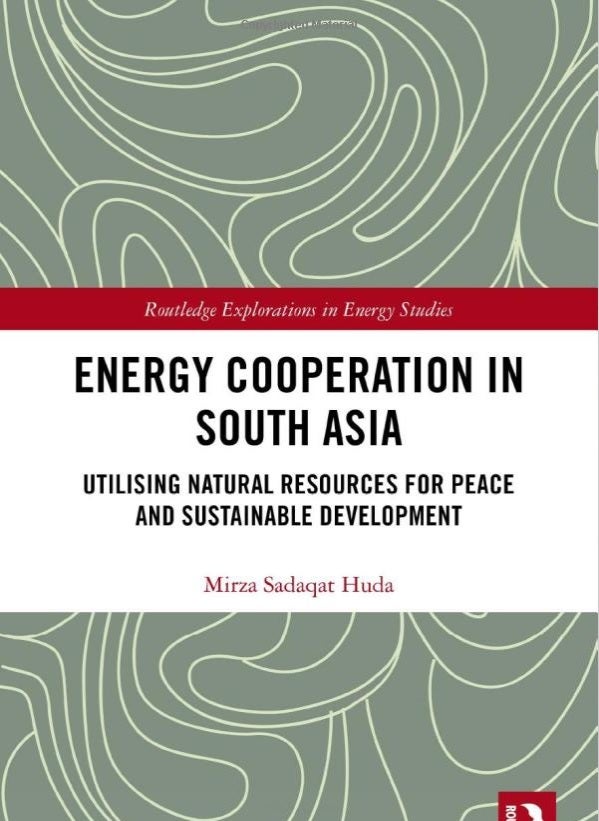Fueling South Asia’s Energy Goals
Mirza Sadaqat Huda
11 August 2020Fueling South Asia’s Energy Goals
Dr S Narayan
Energy Cooperation in South Asia:
Utilising Natural Resources for Peace
and Sustainable Development
By Mirza Sadaqat Huda
Taylor and Francis, 2020
South Asia is primarily energy fuel deficient in that all countries in the region are dependent on substantial imports of fuel, including coal, oil and natural gas, to meet their growing energy needs. At the same time, there is an abundance of hydroelectric generation potential as well as substantial opportunities for renewable energy generation, including solar power and wind energy.
Economic growth in South Asia is likely to double demand in energy consumption in the next decade, and it is in this context that member countries are attempting to address the needs for energy sources. Given the geographical contiguity of the countries in the region, it appears obvious that there should be attempts to leverage strengths in supply and demand in the various countries to attempt to cooperate in the production and consumption of energy, and that the member countries should be eager to leverage their supply advantages to meet the demand of their neighbors. However, the scope of bilateral energy projects and multilateral cooperation has been extremely limited in the years since 1947 when the subcontinent gained independence from Britain.
There have been a large number of studies that have argued for the economic and developmental advantages of energy cooperation within the South Asian countries. However, there have only been a few that have attempted to examine the bottlenecks to such cooperation, and the reasons such cooperation has been so very limited till date. Dr Huda’s book examines this from the angle of international relations and argues that these failures are due to “ideational issues, the failure of leadership and a particular conception of history”.
This is a very well researched book, and the author delves into international relations theory to create a structure for his arguments. Among his premises is that existing cooperation for cross-border projects has been limited to bilateral projects, like those between Bhutan and India or Nepal and India. It is only recently that trilateral electricity-sharing projects between Nepal, India and Bangladesh have been put in place. The cooperation with Bangladesh is also bilateral for energy production and sale. The author argues that India has been reluctant to adopt a multilateral framework for energy exchange. Such a framework could lead to better regulation and management of transmission of the integration of grids as well as risk mitigation of supply and demand. Bilateral cooperation based on fixed power purchase agreements, however, limits risk and reward to the supply and demand points.
The root cause for limiting cross-border partnerships to bilateral and single project transactions appears to be a hesitation from both parties to enlarge the ambit of cooperation from a purely commercial angle to the angle of a larger, integrated, regional strategy. The author argues that this is due to the reluctance of leadership to take on political risks due to lack of trust between the negotiating parties. This lack of trust is exacerbated by the periodic change in leadership in almost all South Asian countries. Energy cooperation agreements are by nature time consuming as they have to work through the smallest details of risk and reward and mitigation of shortfalls in supply and payments. Changing political environments, as well as changes in leadership in the negotiating countries, have been responsible for the very slow pace of negotiations and the very limited successes so far.
The author also points out the lack of attention paid to environmental concerns. In the case of oil pipeline projects, environmental risk mitigation is vital all along the pipeline, while for hydropower projects, those affected are at the generation end. The inability or reluctance to address these issues is also an important factor in the tardy progress of multilateral cooperation. The book has outlined a number of ways in which leaders across the political hierarchy can address these challenges to energy cooperation.
Dr Huda also examines the need for more stakeholder consultation, especially those affected in project areas. Often, negotiations are held at technical or political levels; the people who are likely to be affected economically through loss of land and livelihoods are not taken into confidence. Linked to these are security challenges, not just of inter-country security issues, but also the security of the project itself, and how it would be taken care of through the life of the project.
Using constructivism as a broad conceptual framework, the study has divided the political challenges to cooperation into a number of distinct impediments comprising ideational issues, the failure of leadership on multiple levels and particular conceptions of history.
The author has undertaken case studies of four cross-border energy projects in South Asia to illustrate his arguments. These are the Myanmar-Bangladesh-India Pipeline, the Turkmenistan-Afghanistan-Pakistan-India Pipeline, the Tipaimukh Dam and hydroelectric projects between Bangladesh, Bhutan, India and Nepal. He argues that planning processes, which account for the interests of various stakeholders, as well as environmental and socio-economic issues, can significantly enhance the feasibility of energy projects. The book suggests that investment in the planning of regional energy projects can increase their viability and also drive integration and peace-building.
. . . . .
Dr S Narayan is Visiting Senior Research Fellow at the Institute of South Asian Studies (ISAS), an autonomous research institute at the National University of Singapore (NUS). He is a former Chief Economic Advisor to the Prime Minister of India. He can be contacted at snarayan43@gmail.com. The author bears full responsibility for the facts cited and opinions expressed in this paper.
-
 More From :
More From :
-
 Tags :
Tags :
-
 Download PDF
Download PDF



